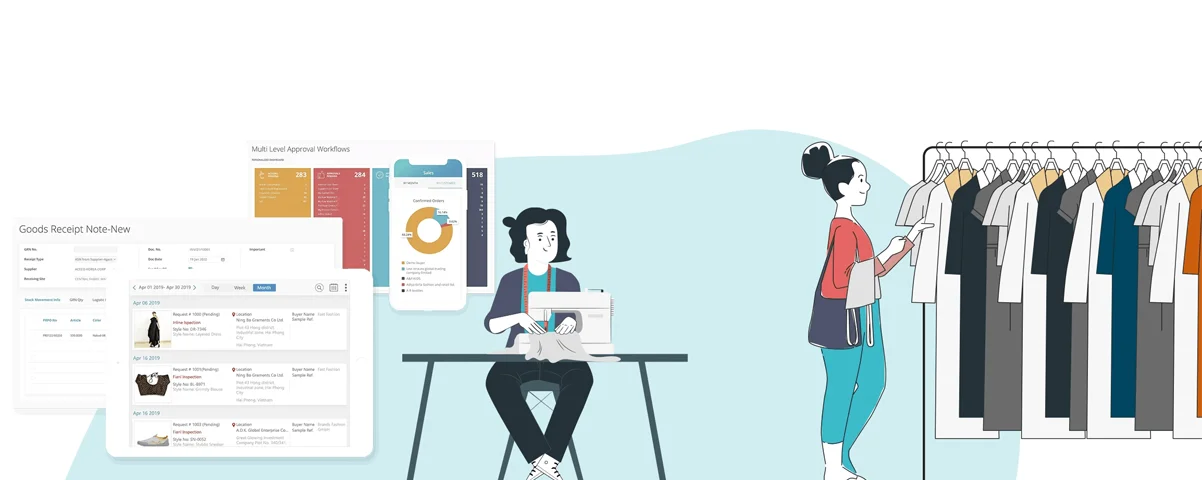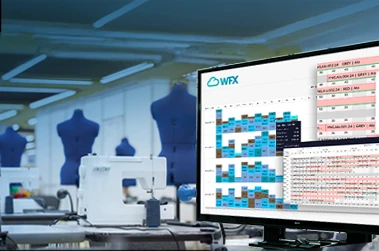1. Enhances Coordination and Collaboration between Departments
Many apparel companies still rely on spreadsheets or emails for data exchange between different teams responsible for designing and producing garments. This often leads to delays, errors, and increased costs.
A garment ERP solution fosters a clear and consistent system for communication, allowing different teams to share information in real-time. This minimizes communication errors, misunderstandings, and enhances transparency and accountability throughout the organization, resulting in faster turnaround times and higher employee satisfaction.
No more missing deadlines because no one knows what anyone else is doing!
2. Streamlines and simplifies operations
Garment production is full of a labor-intensive process, all of which need to be meticulously tracked to ensure smooth business operations. Garment ERP software streamlines this process by reducing manual data entry and analysis.
The solution helps you standardize manufacturing processes according to industry best practices, to simplify operations and save time. It also allows you to automate many manual tasks, such as the generation of sales orders, RFQs or purchase orders.
By integrating all aspects related to production into one unified system, you reduce employee effort and save on costs at the same time — which means more profit for you!
3. Centralizes data and Improves decision making
One of the most powerful benefits of a garment ERP solution is its ability to centralize information. This means that you always have access to all relevant data to make better decisions and make them quickly.
A centralized business management system is helpful for many reasons:
- Access more information, across multiple channels and business units, in one place so you can see the big picture.
- Easier for managers across all levels, not just top leadership, to see what’s going on in their department.
- See how the business is performing in real-time rather than relying on outdated estimates to make decisions.
In the age of predictive analytics and AI, access to consolidated business data is essential for any modern fashion business.
4. Reduces supply chain risks by keeping all partners informed
Effective communication is vital for reducing inefficiencies in the fashion supply chain. A garment ERP system facilitates seamless information sharing among partners, ensuring everyone is on the same page about shipment schedules and deliveries.
Better communication helps you avoid surprises in the fashion industry! Sharing information allows each partner in your supply chain to see how their actions affect other parts of it, which makes their work easier and more effective because they know what they need to do.
5. Real-time Inventory Management from Anywhere
Managing inventory is a significant challenge in the apparel manufacturing process. Your success depends on it! You need efficient inventory management software to track inventory at all times, from raw materials and finished products to supplies, work-in-progress (WIP) items, and even samples. You must ensure that enough stock is available at each stage of production while minimizing excess inventories or out-of-stock situations.
Good apparel industry software lets you manage inventory in real-time and automate reorders by integrating both internal and external budgets, and targets. With mobile access to the ERP system, inventory management becomes possible from anywhere, even outside the workplace.
6. Facilitates Compliance with International Standards
Adhering to international compliance standards is crucial for maintaining healthy relationships with international customers and upholding your brand image. This is especially important if you have customers in multiple markets—your compliance requirements depend on where a product is being sold.
For example, some countries require that all products be tested for lead content before they can be sold. Other countries may have restrictions on the types of chemicals used during production. Garment ERP software tracks incoming materials and suppliers, allowing your team to quickly assess compliance with international standards and make necessary adjustments to processes.
7. Empowers Business Agility and Flexibility
Flexibility and agility are vital traits for any successful apparel business. You’re not going to be able to meet a tight deadline if your ERP software prevents you from changing order quantities during production.
A modern and user-friendly garment ERP software enables companies to respond quickly to market changes, customer demands, and promotions. It facilitates easy communication with key stakeholders and keeps a log of all changes made throughout the supply chain process.






